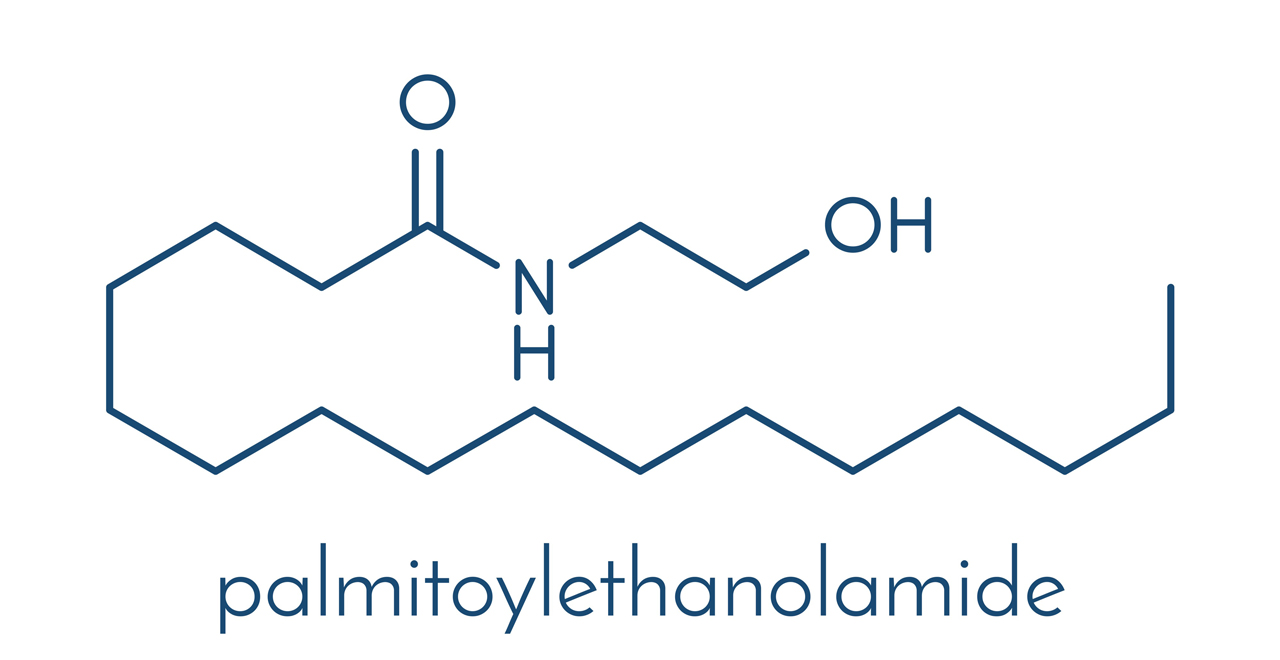Palmitoylethanolamide (PEA) is a naturally occurring fatty acid amide that is synthesized in the body. It is often used as a supplement for its potential therapeutic effects. PEA has garnered interest for its anti-inflammatory, analgesic (pain-relieving), and neuroprotective properties.
Benefits of Palmitoylethanolamide
1. Pain Relief (Analgesic Effect)
- Chronic Pain Management: Palmitoylethanolamide is known to have analgesic properties, which can help alleviate chronic pain conditions such as neuropathic pain, fibromyalgia, and osteoarthritis.
- Anti-Inflammatory: It works by modulating the immune system and reducing inflammation, which contributes to pain relief.
- Endocannabinoid System Modulation: Palmitoylethanolamide interacts with the endocannabinoid system, particularly the CB2 receptor, which plays a role in reducing pain and inflammation.
2. Anti-Inflammatory Effects
- Palmitoylethanolamide has been shown to reduce inflammation in various tissues by inhibiting inflammatory pathways. It can reduce the production of pro-inflammatory cytokines and other inflammatory mediators.
- This effect is beneficial in conditions like arthritis, colitis, and other inflammatory diseases.

3. Neuroprotective Properties
- Palmitoylethanolamide has been investigated for its potential to protect the nervous system. It may help in conditions involving nerve damage or neurodegenerative diseases.
- It has been found to promote neuroplasticity and support the repair of damaged nerves.
4. Mood and Anxiety Regulation
- Some studies suggest that Palmitoylethanolamide might have a role in improving mood and reducing symptoms of anxiety and depression, likely due to its effects on the endocannabinoid system and its ability to modulate inflammation in the brain.
- It may promote a sense of well-being by influencing certain brain receptors that affect mood regulation.
5. Improved Immune System Function
- Palmitoylethanolamide is thought to modulate immune responses, potentially benefiting people with autoimmune or inflammatory conditions. Its immunomodulatory effects help to reduce excessive or inappropriate immune reactions.
6. Support in Neuropathic Disorders
- For people suffering from neuropathic pain (nerve pain), Palmitoylethanolamide has shown promise in reducing symptoms such as burning, shooting, or stabbing pain, often associated with conditions like diabetic neuropathy, post-herpetic neuralgia, and sciatica.
7. Muscle and Joint Pain Relief
- Palmitoylethanolamide has been used as a supplement to reduce muscle and joint pain, especially in inflammatory conditions like arthritis or overuse injuries.
- It may reduce the sensation of pain and discomfort, improving mobility and quality of life.

8. No Significant Side Effects
- Palmitoylethanolamide is generally well-tolerated and does not have significant side effects. It is considered safe for long-term use, with minimal risks compared to other pain-relieving or anti-inflammatory medications.
9. Potential Use in Skin Conditions
- Palmitoylethanolamide has been studied for its potential benefits in treating conditions like eczema, psoriasis, and other inflammatory skin conditions, due to its ability to modulate inflammation.
10. Possible Benefits in Other Health Conditions
- There is ongoing research into the role of Palmitoylethanolamide in conditions such as multiple sclerosis, Alzheimer’s disease, and Parkinson’s disease, where its anti-inflammatory and neuroprotective effects may offer benefits.
Mechanisms of Action:
- Activation of PPAR-α: Palmitoylethanolamide activates peroxisome proliferator-activated receptor alpha (PPAR-α), a nuclear receptor involved in regulating inflammation, lipid metabolism, and cell survival.
- Inhibition of Mast Cells: Palmitoylethanolamide can prevent the release of inflammatory mediators from mast cells, which play a central role in allergic and inflammatory responses.
- Endocannabinoid Modulation: While Palmitoylethanolamide is not a cannabinoid, it influences the endocannabinoid system and acts on receptors like the CB2 receptor, which contributes to its pain-relieving and anti-inflammatory effects.

Dosage and Usage
- Typical Dosage: The standard dosage of Palmitoylethanolamide ranges from 300 to 1,200 mg per day, although individual needs may vary.
- Forms: Palmitoylethanolamide is available in capsule, tablet, and powder form. Some formulations also combine Palmitoylethanolamide with other compounds like luteolin for enhanced effects.
Conclusion:
Palmitoylethanolamide is a versatile compound with promising applications in pain management, inflammation reduction, and neuroprotection. It has a good safety profile, with few side effects reported, making it an attractive option for those dealing with chronic pain or inflammatory conditions. However, as always, it is recommended to consult a healthcare provider before starting any new supplement, especially if you are taking other medications.
